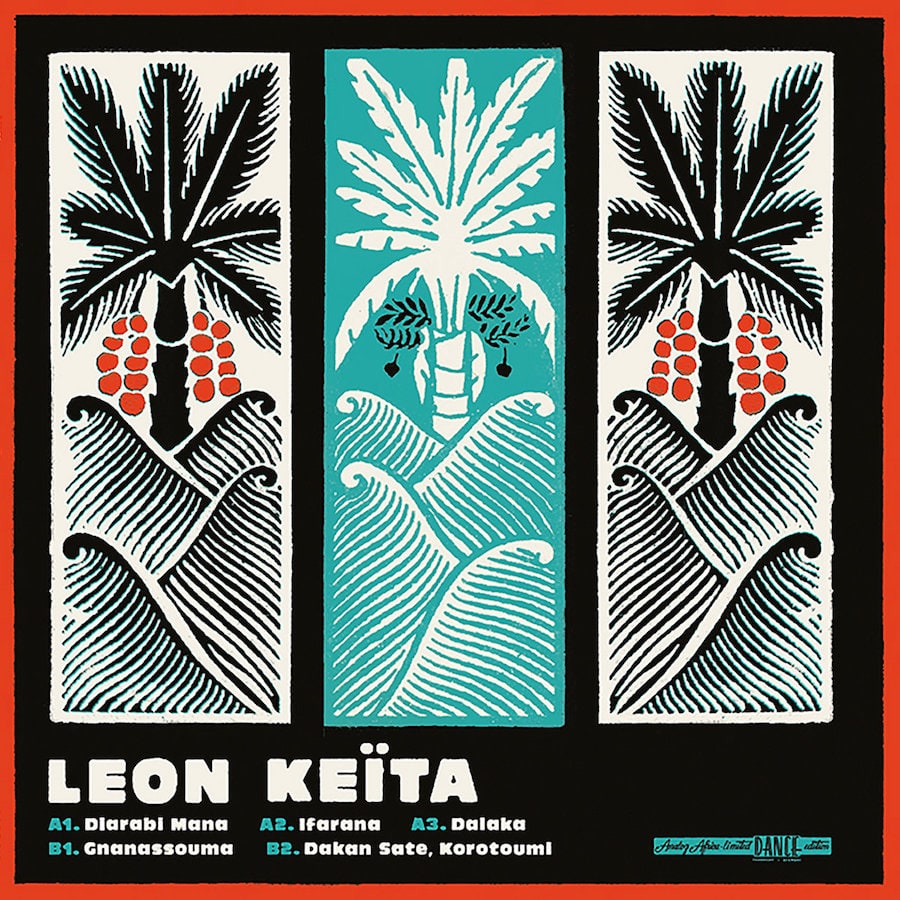
A trip to Bobo Dioulasso in Burkina Faso in 2006 saw Analog Africa founder Samy Ben Redjeb drawn to the city to explore the Madingue culture (the Mandinka or Malinkebeing a West African ethnic group), where the sounds of neighbouring Mali and Guinea had merged with local styles. Whilst giants of Madingue, such as Bembeya Jazz National and Super Djata Band de Bamako, led by the late Zani Diabaté, were still best sellers, during his time there, Redjeb was able to source most of the recorded output of Guinean guitarist Leon Keïta, from which this latest offering, Leon Keïta (Analog Africa Limited Dance Edition No.16), has been compiled.
Born in 1947 in the Atlantic coast town of Conakry, the capital of Guinea, Leon moved to Bamako after finishing his education. Work in the Malian capital included teaching, organising festivals, accountancy and writing reports for the first president of the newly declared independent nation of Mali, Modibo Keita. Somehow, he also managed to find time to create the Piano Jazz Orchestra.
1970 saw him help found the legendary Rail Band de Bamako. This group held a residency at the Buffet Hotel bar of Bamako’s railway station and was sponsored by the railway administration. Combining traditional Malian music with Afro-Latin jazz influences and electrical instrumentation, this band achieved world renown and launched the international careers of artists such as Salif Keita and Mory Kanté.
Sleeve notes tell us that Leon left this band to join Les Ambassadeurs Internationaux, formed after the split of Les Ambassadeurs du Motel de Bamako, according to Discogs, with whom he toured throughout West Africa, before departing this band to work on his own compositions.
The fruits of these efforts saw the release of two LPs in 1978 on the Paper-Disco label (the Ivory Coast imprint rather than that of the north of England), featuring members of Les Ambassadeurs Internationaux as his backing band, both of which, somewhat confusingly, are eponymously titled. Rythmes et Mélodies du Mali, an album co-written and credited with his brother Germain, was released a year later. Backed by the Orchestre Black Santiago, a pioneering Beninese band formed in 1964 that combined genres such as Afrobeat and Afrofunk, and led by the late, great trumpet player Ignace de Souza, this LP was recorded in Benin and saw the light of day on the Disques Tropiques label.
It is from these recordings that the five songs on the vinyl under review (six on the digital download) were culled, tracks which are defined by Mandingue but fused with Afrobeat, Afro-Cuban, funk, jazz, pop and electronic influences.
The oldest recording on the album, Ilarana, the shortest track in this collection at 6 minutes 39 seconds, is the only one taken from the eponymous 1978 album with the catalogue reference DISCO 011. The electronic keyboard, which opens the track, soon blends with dynamic percussion and insistent duel or multi-tracked vocals, which, like all tracks on the album, are sung in Malinké languages. The wonderful melody lines are interspersed with instrumental solos, the guitar, horn and organ chopping and changing in turn, much like Western jazz, with a chugging keyboard holding things together in the background.
Two songs are taken from his other 1978 self-titled album, the DISCO 018 release. The first of these, issued in August as the second single from the compilation, is Gnanassouma. The repetitive, rippling guitar notes and percussive drum beats are echoed by the equally repetitive, strident lead vocals before a spacy lead guitar solo gives way, at just over three minutes, to horns playing almost free-form jazz, only for that sound to be replaced by a keyboard solo of Keith Emerson hypnotic, prog-rock proportions.
A similar feel is provided by the epic Dakan Sate, Korotoumi. Razor-sharp guitar, drums and keys, with the faintest hint of a reggae vibe, are overtaken by glorious call-and-response style vocals before funky horns and expansive organ lines combine in an explosion of frenetic, hedonistic energy. Imagine a fusion of Osibisa and Grateful Dead, and you still wouldn’t be close to the psychedelic wig-out created here.
The three other songs are all taken from 1979’s Rythmes et Melodies. The opening track on this compilation, and its first digital release, Diarabi Mana starts with a plaintive, unaccompanied vocal before woozy, 60’s style organ and keys, think Joe Meek, combine with the percussion and brass to produce infectious, toe-tapping rhythms which are later enhanced by guitar and horn solos of the highest order.
At just under 8 minutes long, the overall sound present on Dalaka is equally as frenetic. Again, the opening stylophone-like keyboard is augmented by Latin-influenced percussion and trumpet as the vocals weave in and around before a guitar solo, which sees meandering finger journeys up and down the fretboard interspersed with choppy chords. The audacious polyrhythms and, at times, cackling vocals build gradually as the tempo seems to creep up unawares to the stertorous finale.
Available on the digital release only, Domanin completes the trio of pieces from Rythmes et Melodies and is pretty much from the same mould. The instrumentation creates an initial Arabic feel, further reinforced by the vocals. The mood and atmosphere change as the song develops, as a more joyful, highlife groove is generated. Contagious sounds indeed.
Once again, Analog Africa are to be congratulated on having unearthed another gem. Leon Keïta (Analog Africa Limited Dance Edition No.16) is an irresistible riot of rhythm, its dazzling virtuosity a feast for the ears, sounding as fresh today as when it was recorded.
Released on 6 October 2023, the LP, pressed on 180g virgin vinyl in a screen-printed sleeve, is limited to 2000 copies worldwide. The album is also available via digital download & streaming.
Pre-order via Bandcamp: https://analogafrica.bandcamp.com/album/leon-keita-analog-africa-dance-edition-no-16
